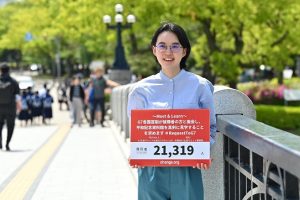Hiroshima Voices: “No Nukes, No War” Yuna Okajima, 18, first-year student at Hiroshima University, Higashi Ward, Hiroshima
May 18, 2023
Rather than a performance, honest debate is needed
by Kyoko Niiyama, Senior Staff Writer
Yuna Okajima initiated an online signature drive to demand that the leaders gathering in Hiroshima for the summit meeting of the G7 (Group of Seven industrialized nations) meet with A-bomb survivors and tour the Hiroshima Peace Memorial Museum, located in the city’s Naka Ward. In March, she submitted 21,319 signatures collected in the drive to Japan’s Ministry of Foreign Affairs, within which is positioned the G7 Hiroshima Summit Secretariat. Ms. Okajima’s petition urges the Japanese government to lobby the other G7 countries to agree to the demands.
Click here to view the video
When I found out the G7 summit was to be held in Hiroshima, I figured it might be the last opportunity for the G7 leaders to gather in Hiroshima while A-bomb survivors were still alive. I hoped that the leaders would listen directly to the stories of survivors and their firsthand knowledge about the devastation from nuclear weapons. Together with like-minded friends, I began to call for people to sign our petition.
The petition outlines two requests. One is for the G7 leaders to listen firsthand to the accounts of A-bomb survivors and to utilize that information in discussions at the summit concerning the abolition of nuclear weapons. The other is for the leaders to take time touring the Hiroshima Peace Memorial Museum. To convince people overseas about our aim, I asked acquaintances for help in translating information about the petition into English, as well as German, French, and Italian.
I started the drive based on my work as one of the Chugoku Shimbun’s junior writers, an experience that started in my second year of junior high school and lasted through my third, and final, year of high school. Through that work, I had the opportunity to meet with many A-bomb survivors and listen through interviews to the accounts of their A-bombing experiences. I heard stories not only of the devastation that resulted from the atomic bombing on August 6, 1945, but also of the sheer grief of losing family members, persistent health concerns, and discrimination faced by A-bomb survivors after the war. I sensed their rage at nuclear weapons.
I have come to believe that it is incumbent upon the leaders of nuclear weapon states to listen to the accounts of A-bomb survivors and learn of the lifelong suffering caused by the atomic bombing. Instead of sitting passively back, I stood up and decided to raise my voice as a young person who empathized with the thoughts and feelings of A-bomb survivors.
One of my concerns, however, is that the summit might end up merely as performance art on the stage of the A-bombed city. The G7 nations possess or are reliant on nuclear weapons. I worry that any message from the summit to the world that nuclear-based security was discussed might cause our children, future leaders of the world, to despair of ever aiming for a world free from nuclear weapons.
I believe the leaders will earnestly confront the nuclear issue and set a deadline to formulate concrete policies for the abolition of nuclear weapons. I also believe that will lead to pressure being placed on Russia, a country that has invaded Ukraine and continues to threaten the use of such weapons.








